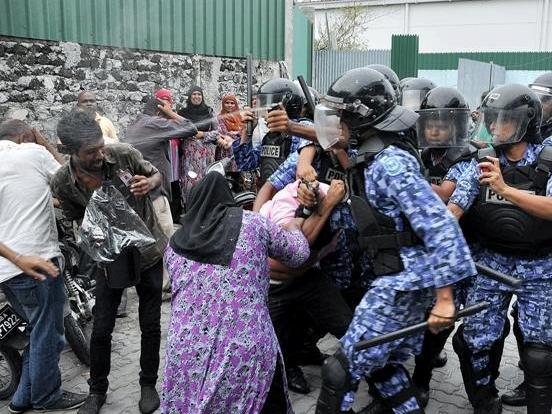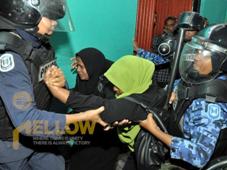The temperature in the United Kingdom hovered around 17°C as Howard Darbon travelled to London’s Gatwick airport to pick up two passengers, before driving them 50 miles back to his home town of Bedford.
The pair shivered in the back seat whilst their compatriots – 5000 miles away and four hours ahead – basked in temperatures of 30°C.
This ‘summer’ will be unlike any previously experienced by these visitors, for reasons far greater than the few degrees missing from the thermometer.
In just over a month’s time the pair of swimmers, from one of the smallest nations on Earth, will represent their country in the world’s largest sporting event, the 2012 Summer Olympics in London.
Howard, the President of Bedford and County Athletic Club and Bedford’s co-ordinator of pre-London 2012 training camps, was taking Husham and Aishath Sajan to meet the families who will open their homes to them whilst they continue their preparations.
They will join five Maldivian athletes who have been living and training within the Bedford community since June 9.
Here, the athletes from the Indian Ocean archipelago will enjoy the use of excellent sports facilities and the warm hospitality available in the Bedfordshire market town.
They can also draw inspiration from its inhabitants – past and present.
Bedford is a town with a strong Olympic pedigree, boasting a long line of British Olympians over the past century.
The 1981 film Chariots of Fire was based on the exploits of Harold Abrahams, born and raised in Bedford, who won Olympic gold at the 1924 games in Paris.
More recently, successful Olympians with strong connections to the town have included two gold medallists at the 2000 Sydney games – Tim Foster (rowing) and Stephanie Cook (pentathlon) – and a silver medallist at the 2004 Athens games – Gail Emms (badminton).
Perhaps the most famous of the town’s athletes is Paula Radcliffe, who currently holds the world record for the women’s marathon. This summer she will be pushing for the Olympic gold that has so far proved elusive in her otherwise incredible career.
Paula is lifetime Vice President of the Bedford and County Athletics Club. The club resides at the Bedford International Athletics Stadium where the Maldivian team will train for the next few weeks.
“Their training facilities are of the highest standard – the athletics stadium, for example, has both indoor and outdoor facilities and possesses the same track surface that has been laid in the Olympic Stadium,” explained Howard.
The stadium also has indoor badminton courts and a 60 metre sprint track. Husham and Aishath Sajan will be able to continue training for their swimming events at Bedford University.
World’s apart, brought together
The training opportunities the athletes will enjoy in Bedford are very different to those in the Maldives’ capital, Male’.
The island, one of the most densely populated on the planet, can offer only limited space for the fostering of athletic talent.
“The biggest challenge we face is with facilities. Athletes don’t have a synthetic track and there is no pool for the swimmers,” explained the Secretary General of the Maldives Olympic Committee (MOC) Ahmed Marzook.
Marzook said that the majority of the committee’s Rf39.2million (US$603,680) budget is provided by the international community.
“A small administrative budget comes from the government – about Rf500,000 (US$32,400). The rest is from the International Olympic Committee, the Commonwealth, or the Olympic Council of Asia,” he explained.
The Maldives’ Olympic contingent this year will include the two swimmers, two athletics competitors – Afaa and Azuneem, and one badminton player – Ajufan.
Whilst swimming facilities may seem ubiquitous in a country which is constituted of 99 percent water, the opportunities for top-level training are scarce.
The swimming and athletics tracks in Male’ are extremely popular and greatly appreciated by the locals who can be found using throughout the day and night. Unfortunately, these facilities don’t come close to matching the facilities that other Olympians headed to London this summer will be used to.
The swimming track in particular, huddled behind the sea wall on the southern side of Male’, perhaps epitomises the uniqueness of the Maldives and the issues it faces in terms of sports and leisure.
It contrasts with the newly built Aquatics Centre in London evinces what is truly special about the Olympic Games.

The extent of the facilities in Male’ is amply displayed by the fact that the last point of departure for Bedford’s two newest residents was not the Maldives, but Sri Lanka, where they have been preparing for their events.
Similarly, the Maldives’ Badminton entrant, Ajufan, lives and trains in Malaysia after winning a scholarship from the International Olympic Committee (IOC).
Ajufan is the first Maldivian to qualify for an Olympic event – with all previous representatives being entered as wildcards. He will travel to the United Kingdom one week before the games so as not to interrupt his training schedule.
The Maldivian team will move onto the campus of Bedford University at the start of July and will have the opportunity to stay at the Olympic Village from July 18.
There they will join 17,000 other athletes, just a stone’s throw away from the main Olympic venues in east London.
In addition to the five athletes who will compete at the games, three more training places were made available to the Maldives’ National Olympic Committee (NOC).
These places have been taken up by two table tennis players, Mueena and Shiura, and a second badminton player Shabeen.
Olympic Spirit
This summer will be the Maldives 7th appearance at the games, having first appeared in the Seoul Olympics in 1988.
The Maldives has never appeared on any medals tables, however, and only the most optimistic of Maldivians would anticipate seeing their compatriots atop any podiums this summer.
But to look only at this aspect of the event is to miss the bigger picture of the games – to see only the tip of the iceberg.
Whilst it is unlikely that these athletes will return home with medals round their necks, they will undoubtedly be carrying experiences in their hearts which will last long after the gleam of the medals has faded.
It is likely that these athletes from smaller nations such as the Maldives will gain far more than those medallists from more developed nations – both personally and professionally.
“It is a huge exposure – it is so important to experience new cultures,” said Marzook.
All of the Maldives’ competitors are under 24 years of age, with two of the team only 18.
The athletes have been warmly welcomed into the Bedford community which will be firmly behind the Maldivians during the games – 100,000 Bedfordians will make a useful addition to the 300,000 Maldivians back home.
Pilgrim’s School in Bedford has celebrated the coming games with its own Olympic Games programme. The Maldivian team were invited to both the opening and closing ceremonies.
During the opening ceremony, the team had the chance to meet one of Britain’s medal hopefuls, Jessica Ennis, who currently ranks number one in the world in the heptathlon (see title picture).
The Olympic team’s coaching has been organised by Howard, who has also arranged training partners to ensure that the team makes the most of its time in Bedford.
“To complement their hard training regime, the athletes undertake visits to schools to inspire their pupils, who, when they know that Azuneem may run against Usain Bolt in the 100m, immediately recognise a star in their presence,” said Howard.
The games will also have a profound impact on the team’s athletic development, as Howard explained.
“All the athletes are working hard, learning new techniques and benefitting from the coaching that we are providing,” he said.
Table-tennis player Mueena agreed: “Our training is going extremely well – this is the best coaching we have ever had and we are working really hard to improve our game.”
“I have learned some new strokes and, as a result, my overall game is improving all the time,” added Shiura.
Marzook of the NOC noted that the experience of these games will be vital for upcoming regional competitions, in particular the South Asian Games in February 2013.
“The ultimate aim is to win something in the regional games. These athletes will be key for the future,” he said.
The benefits of exposure to new techniques and fellow athletes can be seen in the progress of Ajufan since his move to Malaysia.
“Ajufan has gone from around 590th to 212th in the world rankings,” Marzook explained.
Similarly, the experiences of the Maldivian rowers at their own olympic qualification event in April showed the many ways in which such occasions can assist in the development of young athletes.
Despite the failure of the team to qualify, the team’s coach – and former British Olympic rower – Natasha Howard explained the benefits of having access to top class equipment and top class athletes.
“Both athletes are really enjoying themselves and getting the most out of being surrounded by professional sportsmen and women, asking lots of questions and building their knowledge of the sport.”
With the help of the Bedford community, the Maldives’ athletes will benefit immeasurably from their summer in Britain.
When the London games have drawn to a close, the Maldives team will undoubtedly be bringing the Olympic Spirit home with them, though they will probably want to leave the weather behind.
Likes (0)Dislikes
(0)Dislikes (0)
(0) 



